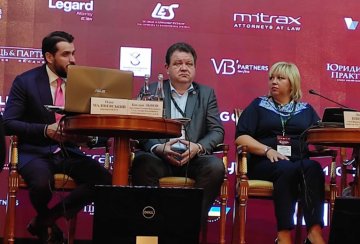Contact center of the Ukrainian Judiciary 044 207-35-46

On 15–16 June 2021 “Yurydychna praktyka” (Legal Practice) weekly holds the IX International Judicial and Legal Forum, which traditionally becomes a platform for expert discussions and exchange of views among the legal community.
While opening the event, Bohdan Lvov, Vice-President of the Supreme Court and President of the Commercial Cassation Court within the Supreme Court, stressed: “For several years, we have been at the epicenter of reform, not only judicial, but more global one, which affects all segments of the legal community: prosecutors, lawyers, etc. Therefore, everyone has already understood that the problems and achievements would also be common. Constantly being at the stage of reforming and planning further changes, we do not even have time to analyze and summarize their intermediate results. It is not really good, but we live in such realities.”
During the professional discussion "Judicial Reform: Reset" Bohdan Lvov drew attention to the issue of staff shortages in courts. “When we talk about 30% of judicial vacancies (in commercial courts – 25%), we must take into account that the total number of judges was formed against the background of the staff shortage in 2016 and now it does not reflect the real state of affairs. Although, in fact, it is necessary to operate with the statistics of 2013, when the number of judges corresponded to the workload,” the speaker stressed. He also added that the judiciary absolutely needed the active HQCJ, which would let it hold competitions for local and appeal courts and fill all vacancies based on the actual workload.
In the opinion of President of the Commercial Cassation Court within the Supreme Court, an effective long-term judicial reform, which will really yield positive results, has to take place at the level of secondary schools. “The path to effective judiciary begins from the quality education of our citizens, bringing up legal culture starting from school. However, today education and science are financed even worse than the judiciary” – the speaker emphasized. However, according to the rapporteur, educational reforms are long and financially costly and do not have an immediate effect in the form of electoral support, and therefore they are very difficult to advance and complicated to implement. Instead, politicians prefer reforms that involve structural transformations (changes in the number or system of courts) that are faster and more visible to the electorate. However, the excessive duration of such reforms proves that they do not have the desired effect.
As for ensuring the unity of the Supreme Court case law, Bohdan Lvov noted that the procedural legislation provided for effective levers for the Supreme Court to be able to resolve existing discordances. However, it is impossible to get rid of this phenomenon finally, because each case is individual. And nowhere in the world this problem is solved for 100%. The quality of judgments is also negatively affected by the overload of judges.
While commenting on the category of minor cases, the speaker reminded that they mostly did not get to the cassation court. At the same time, the appeal courts are currently the least staffed, so the quality, unfortunately, is not high enough. And the self-exclusion of the Supreme Court from the consideration of these disputes will not contribute to the fulfilment of its main purpose, it will be very complicated to talk about quality justice and fairness of judgments. There must be legislative changes so that the Supreme Court can accept any case. It is unlikely that a large number of cases will be accepted, but the Supreme Court will have at least some possibility to respond to the most resonant and fateful complaints.
Summing up his speech, Bohdan Lvov noted that most of today's acute problems can be solved in practice without constant reforms: “Not everyone can be satisfied with judgments. There is no ideal model of the judicial system in any country”.